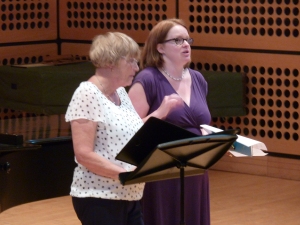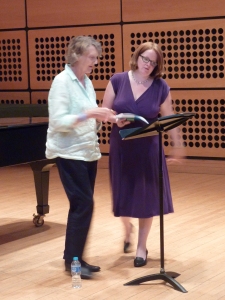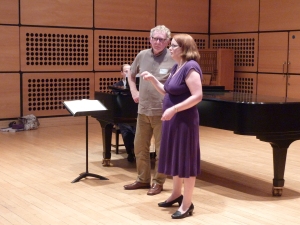 Having founded the Nottingham Choral Trust (now Music for Everyone) in 1983, Angela decided that a permanent chamber choir might add to the confidence of the Nottingham Festival Chorus and enable even more challenging works to be sung. In 1985 she formed an auditioned group, the East of England Singers (EOES), originally intended to perform for part of each season with the East of England Orchestra (now Sinfonia Viva) – hence the name.
Having founded the Nottingham Choral Trust (now Music for Everyone) in 1983, Angela decided that a permanent chamber choir might add to the confidence of the Nottingham Festival Chorus and enable even more challenging works to be sung. In 1985 she formed an auditioned group, the East of England Singers (EOES), originally intended to perform for part of each season with the East of England Orchestra (now Sinfonia Viva) – hence the name.

Some of the current choir have been members ever since, and in June 2015 the choir celebrated its thirtieth birthday with a reunion choir performance of Bach’s magnificent Mass in B minor. Members often say that EOES is the friendliest choir they have ever sung with. We work hard not just at our singing but also for Music for Everyone, with most of us contributing something to other groups, both adult and youth: Tea makers, cake bakers, shop runners, Bookwise helpers, blog writers, programme note writers, tour organisers, membership secretaries, accounts, NFC accompanist, Daytime Voices and Vocals! conductors, accompanists and helpers, recorder players, organist, violinist, harpsichordist, staging, lighting, sound, photography etc. You name it, we do it!
Our next concert is very soon. Saturday 17 October, 7.30pm, St John’s Church, Mansfield Rd, Carrington, Nottingham. The programme, spanning almost three centuries, comprises sacred and secular works that vary in mood from sombre to joyful, and in sound from gentle and melodious to rhythmic and dramatic. There will be trumpets and drums, other brass and wind instruments and, of course, the choir. We would be delighted to see you there and for you to enjoy music by Purcell, Stravinsky, Mozart and Bruckner.
Click here to see the programme and for tickets.
More about EOES and joining the choir.

 It was good to have time to look at the pieces in depth and learn some singing techniques. Angela and Alex talked about the importance of supporting the breath with those abdominal muscles. (Did anyone see Strictly? Weren’t there some abs on view!) We considered the importance of posture, and how to lift the sounds of our voices from strangled-cat in the throat to beautiful and resonating in the mouth.
It was good to have time to look at the pieces in depth and learn some singing techniques. Angela and Alex talked about the importance of supporting the breath with those abdominal muscles. (Did anyone see Strictly? Weren’t there some abs on view!) We considered the importance of posture, and how to lift the sounds of our voices from strangled-cat in the throat to beautiful and resonating in the mouth.
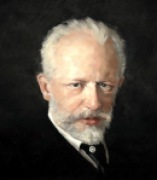 violin and piano, six symphonies and other orchestral works. He wrote songs, instrumental music and opera, the best known of which is Eugene Onegin. He was a troubled man from a young age until his death. Whether he died from natural causes or suicide remains a point of conjecture. He wrote music of passion and deep emotion, but by no means all melancholic. Music, it’s good for the soul.
violin and piano, six symphonies and other orchestral works. He wrote songs, instrumental music and opera, the best known of which is Eugene Onegin. He was a troubled man from a young age until his death. Whether he died from natural causes or suicide remains a point of conjecture. He wrote music of passion and deep emotion, but by no means all melancholic. Music, it’s good for the soul.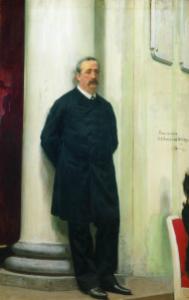 ‘Glazunov … was to fill in all the gaps in Act III and write down from memory the Overture played so often by the composer, while I was to orchestrate, finish composing, and systematise all the rest that had been left …’ (from Rimsky-Korskov’s Chronicle of My Musical Life, 1909)
‘Glazunov … was to fill in all the gaps in Act III and write down from memory the Overture played so often by the composer, while I was to orchestrate, finish composing, and systematise all the rest that had been left …’ (from Rimsky-Korskov’s Chronicle of My Musical Life, 1909)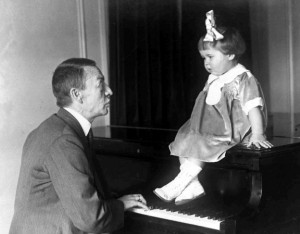


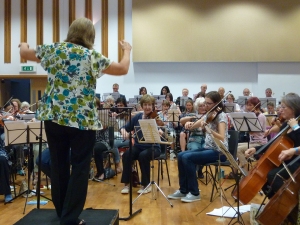


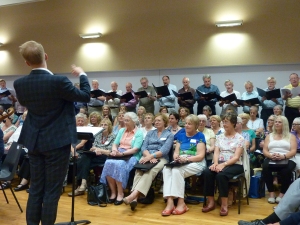

 (I think this was his baby, if you see what I mean), Artistic Director Angela Kay, Adult Programme Co-ordinator Robin Reece-Crawford, Anne, Su and Gemma from the office, tutors and conductors Owen Cox, Mike Gregory, Gill Henshaw, Jane McDouall, Isobel Bounford, accompanists Stefan Reid, Tim Uglow and Martyn Parkes, and other musicians who kindly gave of their time to fill in the gaps or to encourage parts and sections, and of course to all the delegates. (Apologies if I’ve missed anyone.)
(I think this was his baby, if you see what I mean), Artistic Director Angela Kay, Adult Programme Co-ordinator Robin Reece-Crawford, Anne, Su and Gemma from the office, tutors and conductors Owen Cox, Mike Gregory, Gill Henshaw, Jane McDouall, Isobel Bounford, accompanists Stefan Reid, Tim Uglow and Martyn Parkes, and other musicians who kindly gave of their time to fill in the gaps or to encourage parts and sections, and of course to all the delegates. (Apologies if I’ve missed anyone.)
 gave, were a different experience for those of us who sing or play regularly with Music for Everyone. They enabled us not only to hear wonderful performances but to then learn how to improve our own technique and performance.
gave, were a different experience for those of us who sing or play regularly with Music for Everyone. They enabled us not only to hear wonderful performances but to then learn how to improve our own technique and performance.